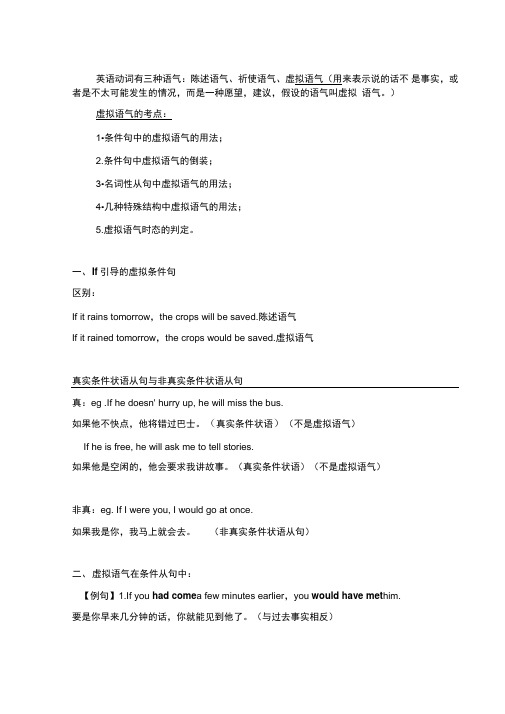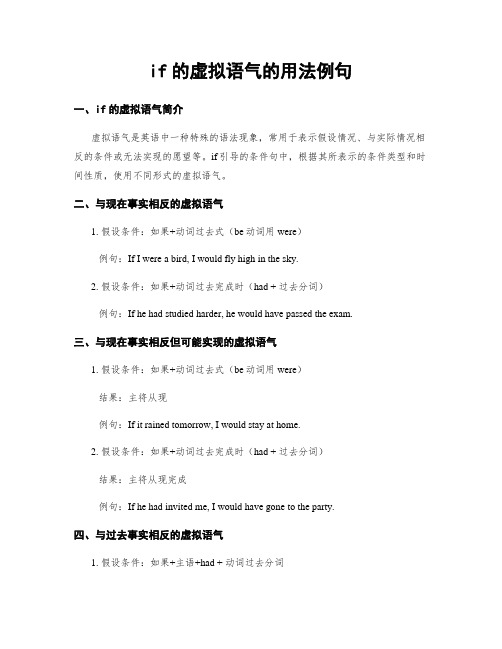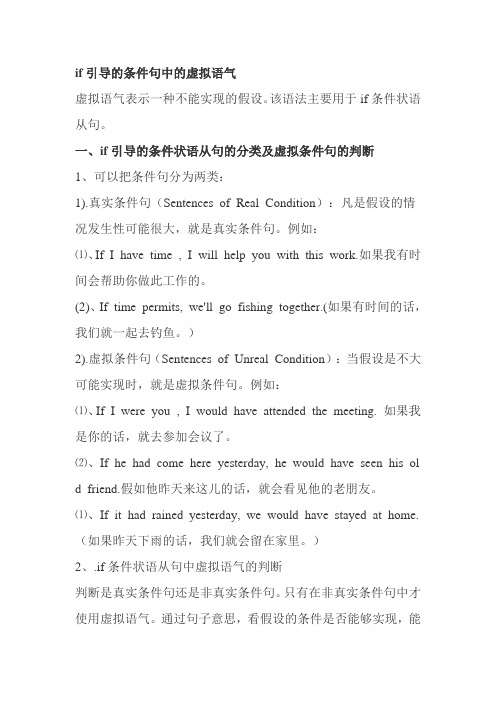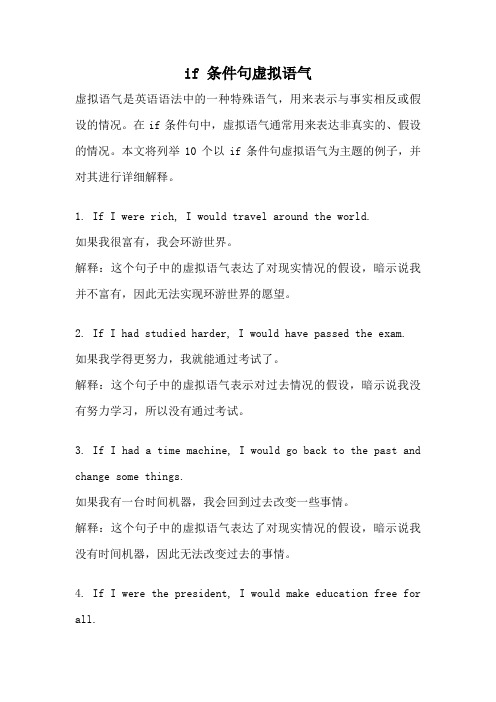If虚拟条件句
if引导的虚拟条件句

Ⅰ、带if的虚拟条件句
与现在事实相反:if条件句用一般过去时(动词be用 were),主句用would(should/could/might)+动词原形
eg: ▪ I am sorry I am very busy just now. If I
与过去事实相反:if 条件句中用过去完成时,主句用 would(should/could/might)+have+过去分词。
If引导虚拟条件句中的谓语动词变化
与将来事实相反时从句中的三种 谓语v变形:
▪ 如果她在这里,她也同意的。 ▪ If she were here, she would agree too.
had time, I would certainly go to the movies with you.
▪ If you could bear the loneliness, you might succeed.
与将来事实相反(推测将来):if 条件句中用过去时, 或 should/were to+ 动 词 原 形 , 主 句 用 would (should/could/might)+动词原形。
to put off the match.
▪ He must have had an accident, or he
then____.
▪ [A]would have been here [B]should be
here
▪ [C]had to be here
[D]wou here, she would agree too. ▪ 假若明天下雨,我们只好推迟这场比赛。 ▪ If it should rain tomorrow, we should have to
高中英语if条件虚拟语气

英语动词有三种语气:陈述语气、祈使语气、虚拟语气(用来表示说的话不是事实,或者是不太可能发生的情况,而是一种愿望,建议,假设的语气叫虚拟语气。
)虚拟语气的考点:1•条件句中的虚拟语气的用法;2.条件句中虚拟语气的倒装;3•名词性从句中虚拟语气的用法;4•几种特殊结构中虚拟语气的用法;5.虚拟语气时态的判定。
一、If引导的虚拟条件句区别:If it rains tomorrow,the crops will be saved.陈述语气If it rained tomorrow,the crops would be saved.虚拟语气真实条件状语从句与非真实条件状语从句真:eg .If he doesn' hurry up, he will miss the bus.如果他不快点,他将错过巴士。
(真实条件状语)(不是虚拟语气)If he is free, he will ask me to tell stories.如果他是空闲的,他会要求我讲故事。
(真实条件状语)(不是虚拟语气)非真:eg. If I were you, I would go at once.如果我是你,我马上就会去。
(非真实条件状语从句)二、虚拟语气在条件从句中:【例句】1.If you had come a few minutes earlier,you would have met him.要是你早来几分钟的话,你就能见到他了。
(与过去事实相反)2.lf it were sunny tomorrow, i would come to see you.明天要是天气好的话,我来看你。
(与将来事实可能相反)3.lf i were you, i would go at once.假如我是你的话,我会马上走。
(与现在事实相反,事实上我不可能是你)主从句的谓语形式(一)与现在事实相反的虚拟条件句表示与现在事实相反的情况,例 1.lf I were you, I would take an umbrella.如果我是你,我会带把伞。
if的虚拟语气的用法例句

if的虚拟语气的用法例句一、if的虚拟语气简介虚拟语气是英语中一种特殊的语法现象,常用于表示假设情况、与实际情况相反的条件或无法实现的愿望等。
if引导的条件句中,根据其所表示的条件类型和时间性质,使用不同形式的虚拟语气。
二、与现在事实相反的虚拟语气1. 假设条件:如果+动词过去式(be动词用were)例句:If I were a bird, I would fly high in the sky.2. 假设条件:如果+动词过去完成时(had + 过去分词)例句:If he had studied harder, he would have passed the exam.三、与现在事实相反但可能实现的虚拟语气1. 假设条件:如果+动词过去式(be动词用were)结果:主将从现例句:If it rained tomorrow, I would stay at home.2. 假设条件:如果+动词过去完成时(had + 过去分词)结果:主将从现完成例句:If he had invited me, I would have gone to the party.四、与过去事实相反的虚拟语气1. 假设条件:如果+主语+had + 动词过去分词结果:主语+would/could/might + have + 过去分词例句:If I had known the truth, I would have made a different decision.2. 假设条件:如果+主语+had not +过去分词形式,结果也用一般过去时态例句:If we hadn't missed the train, we would have arrived on time.五、与将来事实相反的虚拟语气1. 假设条件:如果+动词过去式(be动词用were)结果:主将从现(应该+动词原形)例句:If they were here, they would help us.2. 假设条件:如果+should/were to/might/could/would + 动词原形结果:主将从现(应该+动词原形)例句:If he should call, please ask him to wait.六、虚拟语气中常用的连词和引导短语1. if: 引导条件状语从句,表示假设情况。
(完整版)if引导的条件句中的虚拟语气

if引导的条件句中的虚拟语气虚拟语气表示一种不能实现的假设。
该语法主要用于if条件状语从句。
一、if引导的条件状语从句的分类及虚拟条件句的判断1、可以把条件句分为两类:1).真实条件句(Sentences of Real Condition):凡是假设的情况发生性可能很大,就是真实条件句。
例如:⑴、If I have time , I will help you with this work.如果我有时间会帮助你做此工作的。
(2)、If time permits, we'll go fishing together.(如果有时间的话,我们就一起去钓鱼。
)2).虚拟条件句(Sentences of Unreal Condition):当假设是不大可能实现时,就是虚拟条件句。
例如:⑴、If I were you , I would have attended the meeting. 如果我是你的话,就去参加会议了。
⑵、If he had come here yesterday, he would have seen his old friend.假如他昨天来这儿的话,就会看见他的老朋友。
⑴、If it had rained yesterday, we would have stayed at home.(如果昨天下雨的话,我们就会留在家里。
)2、.if条件状语从句中虚拟语气的判断判断是真实条件句还是非真实条件句。
只有在非真实条件句中才使用虚拟语气。
通过句子意思,看假设的条件是否能够实现,能够实现是真实条件句,不能使用虚拟语气;假设的条件不能实现则是非真实条件句,要用虚拟语气。
判断这个假设是与哪个事实相反。
通常有三种情况:①与过去事实相反。
②与现在事实相反。
③与将来事实可能相反。
3、“后退一步法”后退一步法是指在准确地判断了该句与哪一事实相反后,按虚拟语气的后退一步法处理从句谓语动词的时态。
《if的虚拟条件句》课件

虚拟语气结合使用,以增强表达的语气。
例子
03
He talked as if he had been there. (他说得好像他去过那里
一样。)
as though引导的虚拟条件句
总结词
表示“好像”或“似乎”
详细描述
as though 与 as if 相似,用于表示一种不太可能发生的情况或 虚构的情境,通常与虚拟语气结合使用。
与过去事实相反的虚拟条件句
总结词
表示与过去事实相反的情况,假 设条件与结果关系。
详细描述
使用“if+had+过去分词+主语, 主语 +would/could/might/should+ have+过去分词”的结构,表示 与过去实际情况相反的假设条件 。
与将来事实相反的虚拟条件句
总结词
表示与将来事实相反的情况,假设条件与结果关系。
《if的虚拟条件句》ppt课件
目录
• 虚拟条件句的定义和分类 • if虚拟条件句的形式和用法 • if虚拟条件句的时态 • if虚拟条件句的从句谓语形式 • if虚拟条件句的特殊用法 • if虚拟条件句与真实条件句的转
换
01
虚拟条件句的定义和分类
虚拟条件句的定义
01
虚拟条件句是一种特殊的条件句 ,表示假设或非真实的情况,与 现实情况相反。
if 条件句虚拟语气

if 条件句虚拟语气虚拟语气是英语语法中的一种特殊语气,用来表示与事实相反或假设的情况。
在if条件句中,虚拟语气通常用来表达非真实的、假设的情况。
本文将列举10个以if条件句虚拟语气为主题的例子,并对其进行详细解释。
1. If I were rich, I would travel around the world.如果我很富有,我会环游世界。
解释:这个句子中的虚拟语气表达了对现实情况的假设,暗示说我并不富有,因此无法实现环游世界的愿望。
2. If I had studied harder, I would have passed the exam.如果我学得更努力,我就能通过考试了。
解释:这个句子中的虚拟语气表示对过去情况的假设,暗示说我没有努力学习,所以没有通过考试。
3. If I had a time machine, I would go back to the past and change some things.如果我有一台时间机器,我会回到过去改变一些事情。
解释:这个句子中的虚拟语气表达了对现实情况的假设,暗示说我没有时间机器,因此无法改变过去的事情。
4. If I were the president, I would make education free for all.如果我是总统,我会让教育对所有人免费。
解释:这个句子中的虚拟语气表达了对现实情况的假设,暗示说我并不是总统,所以无法实现让教育免费的目标。
5. If it didn't rain tomorrow, we could go hiking.如果明天不下雨,我们可以去远足。
解释:这个句子中的虚拟语气表达了对未来情况的假设,暗示说明天可能会下雨,所以无法去远足。
6. If I had known you were coming, I would have prepared a meal for you.如果我知道你要来,我会为你准备一顿饭。
if引导的条件句中的虚拟语气
if 引导的条件句中的虚拟语气虚拟语气表示一种不能实现的假设。
该语法主要用于if 条件状语从句。
一、if引导的条件状语从句的分类及虚拟条件句的判断1、可以把条件句分为两类:1) .真实条件句(SentencesofRealConditior):凡是假设的情况发生性可能很大,就是真实条件句。
例如:⑴ 、IfIhavetime,Iwillhelpyouwiththiswork. 如果我有时间会帮助你做此工作的。
(2)、Iftimepermits,we'llgofishingtogether.( 如果有时间的话,我们就一起去钓鱼。
)2) .虚拟条件句(SentencesofUnrealCondition):当假设是不大可能实现时,就是虚拟条件句。
例如:⑴、IfIwereyou,Iwouldhaveattendedthemeeting. 如果我是你的话,就去参加会议了。
⑵、lfhehadcomehereyesterday,hewouldhaveseenhisoldfriend假如他昨天来这儿的话,就会看见他的老朋友。
⑴、lfithadrainedyesterday,wewouldhavestayedathome. (如果昨天下雨的话,我们就会留在家里。
)2、.if条件状语从句中虚拟语气的判断判断是真实条件句还是非真实条件句。
只有在非真实条件句中才使用虚拟语气。
通过句子意思,看假设的条件是否能够实现,能够实现是真实条件句,不能使用虚拟语气;假设的条件不能实现则是非真实条件句,要用虚拟语气。
判断这个假设是与哪个事实相反。
通常有三种情况: ① 与过去事实相反。
② 与现在事实相反。
③ 与将来事实可能相反。
3、“后退一步法后退一步法是指在准确地判断了该句与哪一事实相反后,按虚拟语气的后退一步法处理从句谓语动词的时态。
即:在非真实条件状语从句中,谓语动词按正常情况“后退一步”。
也就是:① 与过去事实相反,在从句中用过去完成时形式表示。
if引导的条件句中的虚拟语气
if引导的条件句中的虚拟语气虚拟语气表示一种不能实现的假设。
该语法主要用于if条件状语从句。
一、if引导的条件状语从句的分类及虚拟条件句的判断1、可以把条件句分为两类:1).真实条件句(Sentences of Real Condition):凡是假设的情况发生性可能很大,就是真实条件句。
例如:⑴、If I have tim e , I will help you with this work.如果我有时间会帮助你做此工作的。
(2)、If time permits, we'll go fishing together.(如果有时间的话,我们就一起去钓鱼。
)2).虚拟条件句(Sentences of Unreal Condition):当假设是不大可能实现时,就是虚拟条件句。
例如:⑴、If I were you , I w ould have attended the meeting. 如果我是你的话,就去参加会议了。
⑵、If he had come here yesterday, he would have seen his old friend.假如他昨天来这儿的话,就会看见他的老朋友。
⑴、If it had rained yesterday, we would have stayed at home.(如果昨天下雨的话,我们就会留在家里。
)2、.if条件状语从句中虚拟语气的判断判断是真实条件句还是非真实条件句。
只有在非真实条件句中才使用虚拟语气。
通过句子意思,看假设的条件是否能够实现,能够实现是真实条件句,不能使用虚拟语气;假设的条件不能实现则是非真实条件句,要用虚拟语气。
判断这个假设是与哪个事实相反。
通常有三种情况:①与过去事实相反。
②与现在事实相反。
③与将来事实可能相反。
3、“后退一步法”后退一步法是指在准确地判断了该句与哪一事实相反后,按虚拟语气的后退一步法处理从句谓语动词的时态。
if虚拟条件句的倒装原则
在英语中,虚拟条件句的倒装原则是在 if 条件句中,在主语和动词之间进行倒装。
这
种倒装结构常用于表示与现实相反或不可能实现的假设、愿望、建议或要求等情况。
以下是几个例子来说明虚拟条件句中的倒装原则:
1. If I were rich, I would travel the world.
Were I rich, I would travel the world.
2. If he had studied harder, he would have passed the exam.
Had he studied harder, he would have passed the exam.
3. If she were here, she would help you.
Were she here, she would help you.
4. If I had known about the party, I would have attended.
Had I known about the party, I would have attended.
需要注意的是,这种倒装结构在正式和书面语中更常见,而在口语中较少使用。
此外,当 if 条件句中使用了情态动词时,仍然遵循倒装原则。
例如:
If he could speak French, he would get a better job.
Could he speak French, he would get a better job.
虚拟条件句的倒装原则可以提升语言的表达效果,但在使用时需要注意语境和语气的
适应性。
if条件句虚拟语气
有关英语if条件句虚拟语气用法
if的虚拟语气用法:
1、现在时:当if引导的虚拟语气表示与现在事实相反时,主句谓语用could、would、shoul d或mi ght加动词原形,条件从句中的谓语用过去式。
2、过去时:当if引导的虚拟语气表示与过去事实相反时,主句谓语用could、would、shoul d或mi ght加have再加动词原形,
3、将来时:当if引导的虚拟语气表示与将来事实相反时,主句谓语用could、would、shoul d或mi ght加动词原形,条件从句中的谓语用过去式。
虚拟语气中,表条件的状语从句的if可以省略,但主语必须与动词易位(也就是倒装):
If it were not for his illness, he could do better.
=Were it not for his illness, he could do better.
如果不是因为他生病,他可以做得更好。
If he had money, he would buy that villa.
= Had he money, he would buy that villa.
对将来情况的虚拟:
主句:主语+would/should/might/could+动词原形从句:should+动词原形/were to+动词原形。
对现在情况的虚拟:
主句:主语+would/should/might/could+动词原形从句:动词过去式
对过去情况的虚拟:
主句:主语+would/should/might/could have+动词过去分词从句:had+动词过去分词。
- 1、下载文档前请自行甄别文档内容的完整性,平台不提供额外的编辑、内容补充、找答案等附加服务。
- 2、"仅部分预览"的文档,不可在线预览部分如存在完整性等问题,可反馈申请退款(可完整预览的文档不适用该条件!)。
- 3、如文档侵犯您的权益,请联系客服反馈,我们会尽快为您处理(人工客服工作时间:9:00-18:30)。
注:几点特别说明1、l would/should/could/might 主句谓语中的should主要用于第一人称后;would表示结果还表示过去经常常常做某事,might表示可能性,could表示能力、允许或可能性。
比较:If you tried again ,you would succeed. 要是你再试一试,你就会成功的。
(would表结果)If you tried again, you might succeed. 要是你再试一试,你可能会成功的。
(might表可能)If you tried again ,you could succeed. 要是你再试一试,你就能成功了。
(could表能力)2、错综时间虚拟条件句即条件从句与主句所指时间不一致,如从句指过去,而主句即指的是现在或将来,此时应根据具体的语境情况,结合上面提到的三种基本类型对时态作相应的调整:If it had rained last night, the ground would be wet now. 要是昨晚下过雨的话,现在地面就会是湿的。
You would be much better now if you had taken my advice. 假若你当时听我的话,你现在就会好多了。
3、 If虚拟条件句的否定(含蓄条件句)常考两个句型:If it weren’t for…和If it hadn’t been for…,其意为“若不是(有)” “要不是”。
如:If it weren’t for water, no plant could grow. 要是没有水植物就无法生长。
If it hadn’t been for your assistance ,we wouldn’t have succeeded.=But for your assistance ,we wouldn’t have succeeded.=Without your assistance ,we wouldn’t have succeeded.4、 If虚拟条件句的倒装形式,即把were, had, should置于句首。
例:Were I in school again (= If I were in school again), I would work harder.Had you aske d me, I would have told you. (=If you had asked me,…) 编辑本段第二类Wish/if only/would rather愿望和as if(though)好像从句分时态I wish I were a pop singer. (=I am sorry I am not a pop singer..)I wish I had never stopped teaching. (=I am sorry I stopped teaching.)I wish they would let us get some sleep.* wish与hope接宾语从句的区别在于:hope表示一般可以实现的希望,宾语从句用陈述语气。
wish表示很难或不大可能实现的希望,宾语从句用虚拟语气。
试比较:(1)We hope they will come. (We don’t know if they can come.) (2) We wish they could come. (We know they are not coming.) l if only 后的句子用虚拟语气要是……就好了if only 与 I wish一样,也用于表示与事实相反的愿望,其后所虚拟语气的时态与 wish后所接时态的情况相同:If only she had had more courage! 她再勇敢一些就好了。
If only I had listened to my parents! 我要是当时听了父母的话就好了。
If only she would go with me! 她要是愿意和我一道去就好了!*if only 通常独立使用,没有主句。
l would rather后句子用虚拟语气只分现在和过去在would rather, would sooner, would just as soon 后的that从句中, 句子谓语习惯上要用虚拟语气,表示"宁愿做什么" ,具体用法为:①一般过去时表示现在或将来的愿望I’d rather you went tomorrow (now). 我宁愿你明天(现在)去。
②用过去完成时表过去的愿望I’d rather you hadn’t said it. 我真希望你没有这样说过。
l as if (though) 从句用虚拟语气以as if (as though)引导的方式状语从句或表语从句,有时用虚拟语气,则与wish用法相同,例:He acts as if he knew me. 他显得认识我似的。
They treat me as though I were a stranger. 他们待我如陌生人。
He talks as if he had been abroad. 他说起话来好像曾经出过国。
注:两点说明(1) 从句所表示的内容若为事实或可能为事实,也可用陈述语气:It looks as if we’ll be late. 我们似乎要迟到了。
(2) 注意 It isn’t as if…的翻译:It isn’t as if he were poor. 他不像穷的样子(或他又不穷)。
编辑本段第三类从句中should+动词原形,should可省略l 在 lest ,for fear that( 以免) , in case (以防)引导的目的状语从句中的虚拟语气She walked quietly lest she (should) wake up her roommates. 她走得很轻以免吵醒她的室友。
l 表应当做值得做一类动词后的宾语从句建议advise, suggest, propose, recommend命令order, command 请求ask, demand, require, request指示direct敦促urge提议move, vote希望desire坚持insist打算 intend安排 arrangeex.I insisted that he (should) stay. 我坚持要他留下。
He urged that they go to Europe. 他敦促他们到欧洲去。
He suggested that we should leave early. 他建议我们早点动身。
He ordered that it (should) be sent back. 他命令把它送回去。
I ask that he leave. 我要求他走开。
He requires that I (should) appear. 他要求我出场。
I move that we accept the proposal. 我提议通过这项提案。
He arranged that I should go abroad. 他安排我去国外。
She desires that he do it. 她希望他做此事。
The general directed that the prisoners should be set free. 将军指示释放那些俘虏。
*suggest表“暗示”insist表“坚持认为”不用虚拟语气比较:He insisted that I had read his letter. 他坚持说我看过他的信。
He insisted that I should read his letter. 他坚持要我看他的信。
He suggested that we (should) stay for dinner. 他建议我们留下吃饭。
I suggested that you had a secret understanding with him. 我觉得你与他心照不宣。
l order,suggestion,idea,plan, proposal, advice, demand等名词后的表语从句或同位语从句Our suggestion is that you( should)be the first to go.我们的建议是你应该第一个去。
*advice, agreement, command, decision, decree, demand, determination, indication, insistence, order, preference, proposal, request, requirement, stipulation, suggestion, idea, plan, order l “It is (was)+ 紧急重要-- 带感情色彩上述demand/suggest等动词过去分词或important,natural,strange ,necessary,surprised, appropriate等形容词后的主语从句1. It is ordered that the army (should) get there by 4 a.m.2. It is necessary that she (should) be sent there at once.*It is necessary,important,strange,natural, advisable, anxious, compulsory, crucial, desirable, eager, essential, fitting, imperative(绝对必要), impossible, improper, obligatory, possible, preferable, probable, recommended, urgent, vital etc. ;it is a pity;It is requested/suggested/desired/proposed编辑本段第四类It’s time后的从句用虚拟语气从句谓语通常用过去式表示 (早)该干某事了*有时也用过去进行时或“should+动词原形”(较少见,且should不能省略)ex. It’s time we went [were going, should go]. 我们该走了。
It’s time I was in bed. 我该上床睡了。
